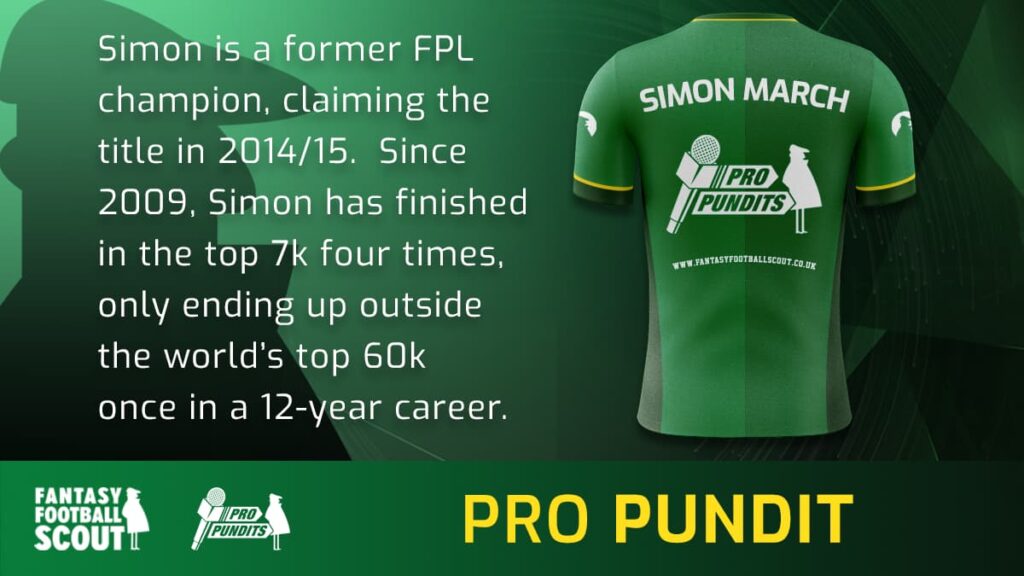Throughout the 2022/23 Fantasy Premier League (FPL) season, our team of Pro Pundits, Hall of Famers and guest contributors will be sharing their thoughts, tips and own transfer plans.
Only Premium Members are able to read every single one of these pieces, so sign up today to get full access not just to the editorial content but all of the other benefits, from hundreds of Opta stats to a transfer planner.
Here, former FPL champion Simon March explains what FPL managers can learn from the sport of rowing.

I once worked for somebody who rowed for Great Britain at the Olympics and he became well-known within the company for being able to find a rowing metaphor to fit almost every occasion. Much as we used to make fun of him for it, I then, in later life, took up rowing myself and realised that, actually he was right; rowing is an excellent metaphor for just about everything, and that includes FPL. So this article will focus on what we, as FPL managers, can learn from the sport of rowing.
Momentum Makes Everything Else Easier
The heaviest strokes in rowing are the first few when you’re moving off from a stationary position but, as you get going, the boat moves faster and everything feels lighter. Similarly, in FPL, the first few Gameweeks are usually the hardest to predict but, if you get things right early on, the rest of your season has the potential to become a lot easier.
The benefits of a good start are varied; you’re ahead of the game in terms of player selection, you can use your transfers to more aggressively take advantage of the next opportunity (rather than just reacting to opportunities missed) and there’s a good chance your team value will also benefit, something which can pay off later in the season when it comes to Wildcarding and Free Hitting.
Is this useful to think about where we are currently mid-way through the season? I think so, because, however dire your current FPL situation might be, it’s worth remembering that you’re always starting the rest of your season and, in two or three good decisions’ time, things may well seem a lot easier. Just as, in rowing, you can get a boat moving in just a few strokes, sometimes all it takes to turn your season around in FPL is just a few good moves in a row.
Keep Steady no Matter What
Rowing can be quite a meditative sport and, unlike FPL, it may actually lower your stress levels. This does not mean, however, that you can just switch off. Maintaining a consistent stroke requires focus and discipline and ‘consistent’ is far more important than ‘fast’. In fact, there’s a saying among rowers that ‘slow is smooth, smooth is fast’; you don’t need to force the pace, as long as you remain consistent, the pace will take care of itself.
In FPL, especially when we find ourselves with a poor rank or stuck in a rut, it’s tempting to force the situation and take bigger and bigger risks in the hope that one big ostentatious move can turn our season around or, at least, accelerate our ascent. While these moves can pay off, they often do more damage than good because they tend to sacrifice long-term plans in favour of short-term gains. Consistency, on the other hand, is much slower to pay off but far more likely to pay off in the long run.
Small Things Add Up
In The Boat Race, the crews from Oxford and Cambridge will row at a rate of around 35 strokes per minute on average. As a result, while no individual stroke will make or break a race, they add up over the course of it, so optimising each one becomes vital to winning.
We talk a lot about differentials in FPL and there is a pervasive belief that picking the correct differentials are what makes the difference between a high and low rank. However, this is not usually the case when you dig into it. What really makes the difference between a high and low rank tends to be the 4-6 points gained or dropped here and there. These could result from something as banal as nailing your goalkeeper rotation or being on the right side of a seemingly 50:50 decision between two players or two captaincy options but, over the course of a season, those 4-6 points add up.
Thus, just as there are no unimportant strokes in a boat race, there are no unimportant decisions in FPL. Mistakes occur and luck is always a factor but sweating the ‘small stuff’ and making every decision count is likely to be far more significant to where we find ourselves come May than picking that one big differential.
Focus on What is Inside the Boat
If ‘sweating the small stuff’ sounds overly stressful, rowing may also have a solution for that; ‘focus on what is inside the boat’.
There’s a lot that can happen when you’re rowing; a wake from another boat can put you off, you can hit something with your oar, you can find yourself rowing through a thunderstorm, a cat can fall off a low-hanging branch and land on your head, all sorts of things. But there’s not a lot you can do about any of these so, the trick is, to try and ignore them and simply focus on what you can influence; your own technique and your own performance.
In FPL, you can’t predict whether a player will get injured, you can’t control Pep or his team selections, you can’t prevent random postponements and you can’t stop a player from missing a seemingly open goal from four yards out. All you can do is make your transfers, pick your players and choose your captain. Time spent thinking about the things you can’t control is literally time wasted and, worse, it will make the game far more stressful than it needs to be. Focus on what you can control, and you’ll likely find that your FPL game improves, as will your enjoyment of it too.

